Employability Skills: Reflective Journal on Strengths and Theories
VerifiedAdded on 2021/04/17
|6
|1164
|33
Journal and Reflective Writing
AI Summary
This journal entry reflects on the student's aspirations to become a bank analyst, utilizing self-assessment tools like the Gallup Strength Finder to identify key behavioral attributes such as responsibility, relator, deliberative, consistency, and command. The entry critically analyzes two employability skill theories: the Gallup Strength Theory, which emphasizes the importance of understanding individual strengths for effective organizational placement; and the Johari Window theory, which aids in understanding interpersonal relationships and self-awareness. The student discusses how these theories have provided insights into their strengths, areas for development, and career goals, while also acknowledging the limitations of each theory. The journal concludes by summarizing the key strengths identified and how they align with the student's career aspirations, highlighting the value of self-reflection and continuous skill development in achieving their professional objectives, and the use of Johari Window to understand aspects of self for career development. References are provided at the end.
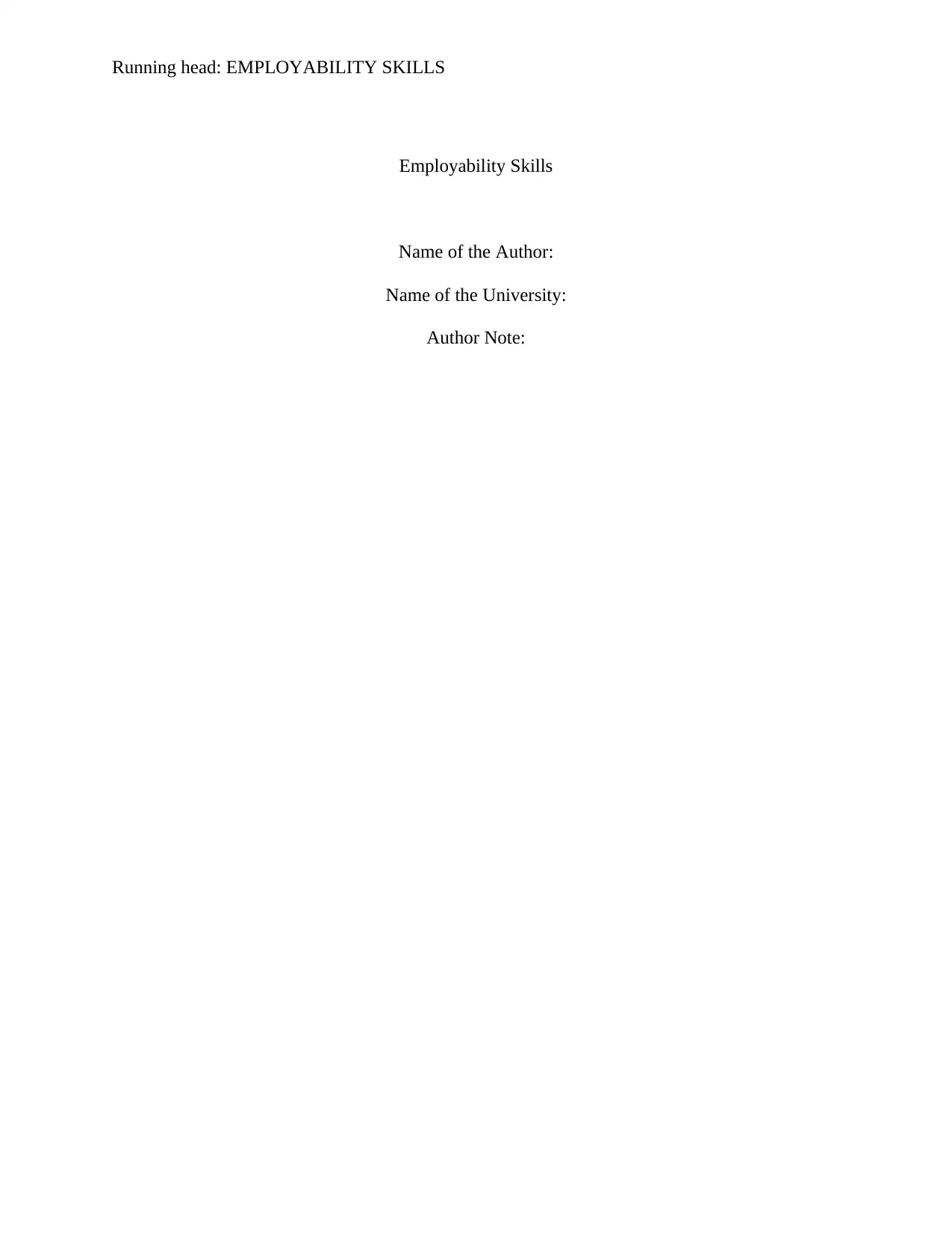
Running head: EMPLOYABILITY SKILLS
Employability Skills
Name of the Author:
Name of the University:
Author Note:
Employability Skills
Name of the Author:
Name of the University:
Author Note:
Paraphrase This Document
Need a fresh take? Get an instant paraphrase of this document with our AI Paraphraser
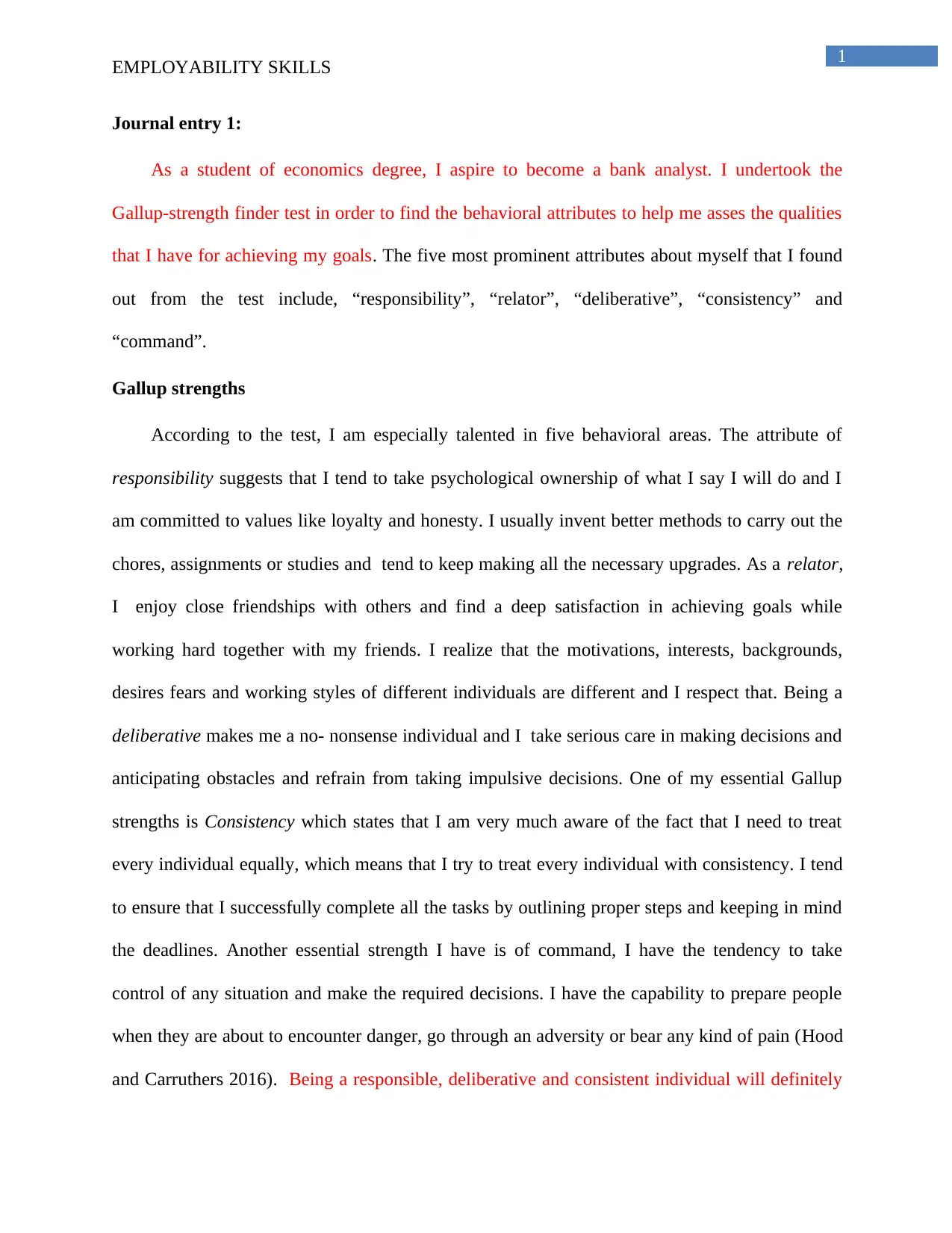
1
EMPLOYABILITY SKILLS
Journal entry 1:
As a student of economics degree, I aspire to become a bank analyst. I undertook the
Gallup-strength finder test in order to find the behavioral attributes to help me asses the qualities
that I have for achieving my goals. The five most prominent attributes about myself that I found
out from the test include, “responsibility”, “relator”, “deliberative”, “consistency” and
“command”.
Gallup strengths
According to the test, I am especially talented in five behavioral areas. The attribute of
responsibility suggests that I tend to take psychological ownership of what I say I will do and I
am committed to values like loyalty and honesty. I usually invent better methods to carry out the
chores, assignments or studies and tend to keep making all the necessary upgrades. As a relator,
I enjoy close friendships with others and find a deep satisfaction in achieving goals while
working hard together with my friends. I realize that the motivations, interests, backgrounds,
desires fears and working styles of different individuals are different and I respect that. Being a
deliberative makes me a no- nonsense individual and I take serious care in making decisions and
anticipating obstacles and refrain from taking impulsive decisions. One of my essential Gallup
strengths is Consistency which states that I am very much aware of the fact that I need to treat
every individual equally, which means that I try to treat every individual with consistency. I tend
to ensure that I successfully complete all the tasks by outlining proper steps and keeping in mind
the deadlines. Another essential strength I have is of command, I have the tendency to take
control of any situation and make the required decisions. I have the capability to prepare people
when they are about to encounter danger, go through an adversity or bear any kind of pain (Hood
and Carruthers 2016). Being a responsible, deliberative and consistent individual will definitely
EMPLOYABILITY SKILLS
Journal entry 1:
As a student of economics degree, I aspire to become a bank analyst. I undertook the
Gallup-strength finder test in order to find the behavioral attributes to help me asses the qualities
that I have for achieving my goals. The five most prominent attributes about myself that I found
out from the test include, “responsibility”, “relator”, “deliberative”, “consistency” and
“command”.
Gallup strengths
According to the test, I am especially talented in five behavioral areas. The attribute of
responsibility suggests that I tend to take psychological ownership of what I say I will do and I
am committed to values like loyalty and honesty. I usually invent better methods to carry out the
chores, assignments or studies and tend to keep making all the necessary upgrades. As a relator,
I enjoy close friendships with others and find a deep satisfaction in achieving goals while
working hard together with my friends. I realize that the motivations, interests, backgrounds,
desires fears and working styles of different individuals are different and I respect that. Being a
deliberative makes me a no- nonsense individual and I take serious care in making decisions and
anticipating obstacles and refrain from taking impulsive decisions. One of my essential Gallup
strengths is Consistency which states that I am very much aware of the fact that I need to treat
every individual equally, which means that I try to treat every individual with consistency. I tend
to ensure that I successfully complete all the tasks by outlining proper steps and keeping in mind
the deadlines. Another essential strength I have is of command, I have the tendency to take
control of any situation and make the required decisions. I have the capability to prepare people
when they are about to encounter danger, go through an adversity or bear any kind of pain (Hood
and Carruthers 2016). Being a responsible, deliberative and consistent individual will definitely
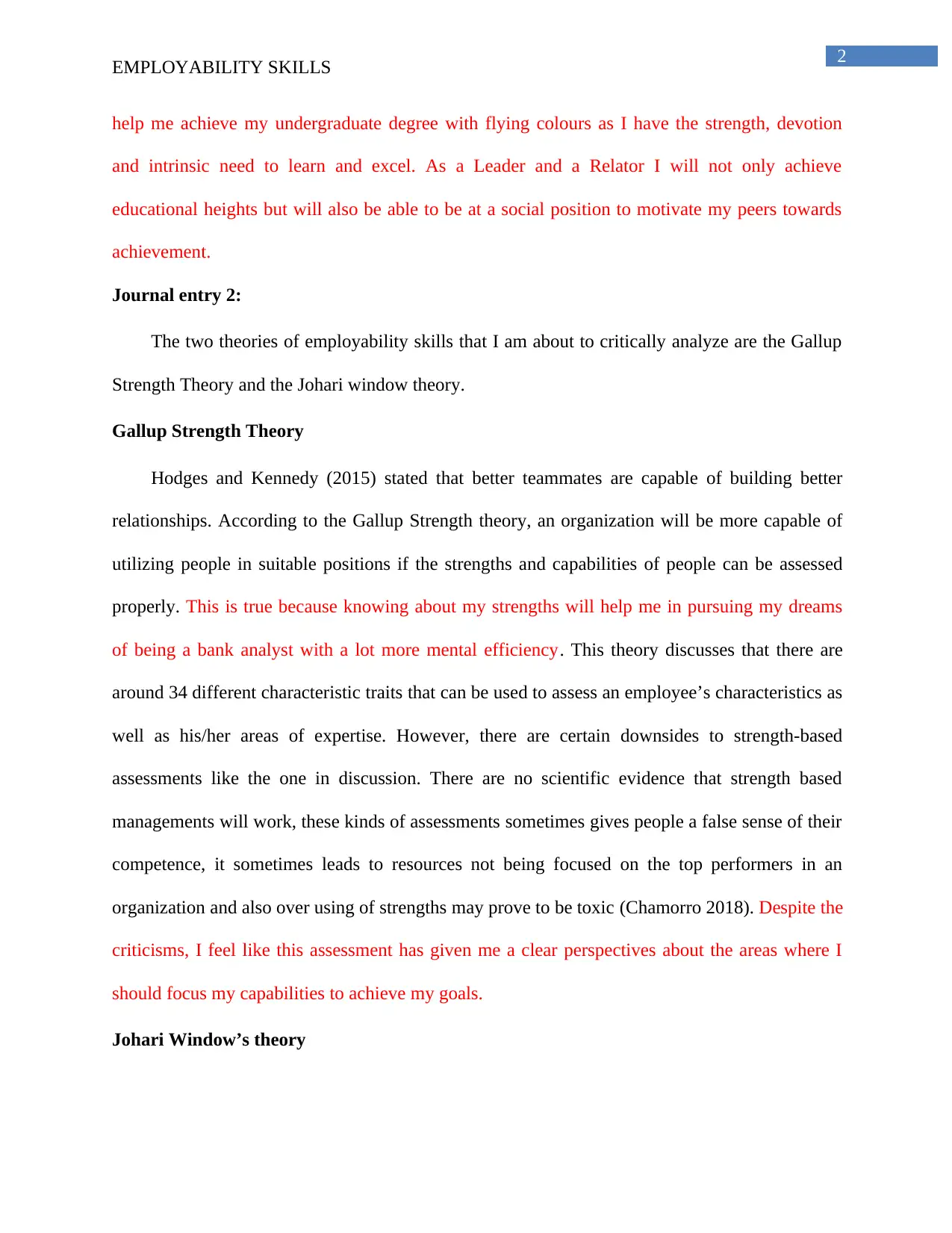
2
EMPLOYABILITY SKILLS
help me achieve my undergraduate degree with flying colours as I have the strength, devotion
and intrinsic need to learn and excel. As a Leader and a Relator I will not only achieve
educational heights but will also be able to be at a social position to motivate my peers towards
achievement.
Journal entry 2:
The two theories of employability skills that I am about to critically analyze are the Gallup
Strength Theory and the Johari window theory.
Gallup Strength Theory
Hodges and Kennedy (2015) stated that better teammates are capable of building better
relationships. According to the Gallup Strength theory, an organization will be more capable of
utilizing people in suitable positions if the strengths and capabilities of people can be assessed
properly. This is true because knowing about my strengths will help me in pursuing my dreams
of being a bank analyst with a lot more mental efficiency. This theory discusses that there are
around 34 different characteristic traits that can be used to assess an employee’s characteristics as
well as his/her areas of expertise. However, there are certain downsides to strength-based
assessments like the one in discussion. There are no scientific evidence that strength based
managements will work, these kinds of assessments sometimes gives people a false sense of their
competence, it sometimes leads to resources not being focused on the top performers in an
organization and also over using of strengths may prove to be toxic (Chamorro 2018). Despite the
criticisms, I feel like this assessment has given me a clear perspectives about the areas where I
should focus my capabilities to achieve my goals.
Johari Window’s theory
EMPLOYABILITY SKILLS
help me achieve my undergraduate degree with flying colours as I have the strength, devotion
and intrinsic need to learn and excel. As a Leader and a Relator I will not only achieve
educational heights but will also be able to be at a social position to motivate my peers towards
achievement.
Journal entry 2:
The two theories of employability skills that I am about to critically analyze are the Gallup
Strength Theory and the Johari window theory.
Gallup Strength Theory
Hodges and Kennedy (2015) stated that better teammates are capable of building better
relationships. According to the Gallup Strength theory, an organization will be more capable of
utilizing people in suitable positions if the strengths and capabilities of people can be assessed
properly. This is true because knowing about my strengths will help me in pursuing my dreams
of being a bank analyst with a lot more mental efficiency. This theory discusses that there are
around 34 different characteristic traits that can be used to assess an employee’s characteristics as
well as his/her areas of expertise. However, there are certain downsides to strength-based
assessments like the one in discussion. There are no scientific evidence that strength based
managements will work, these kinds of assessments sometimes gives people a false sense of their
competence, it sometimes leads to resources not being focused on the top performers in an
organization and also over using of strengths may prove to be toxic (Chamorro 2018). Despite the
criticisms, I feel like this assessment has given me a clear perspectives about the areas where I
should focus my capabilities to achieve my goals.
Johari Window’s theory
⊘ This is a preview!⊘
Do you want full access?
Subscribe today to unlock all pages.

Trusted by 1+ million students worldwide
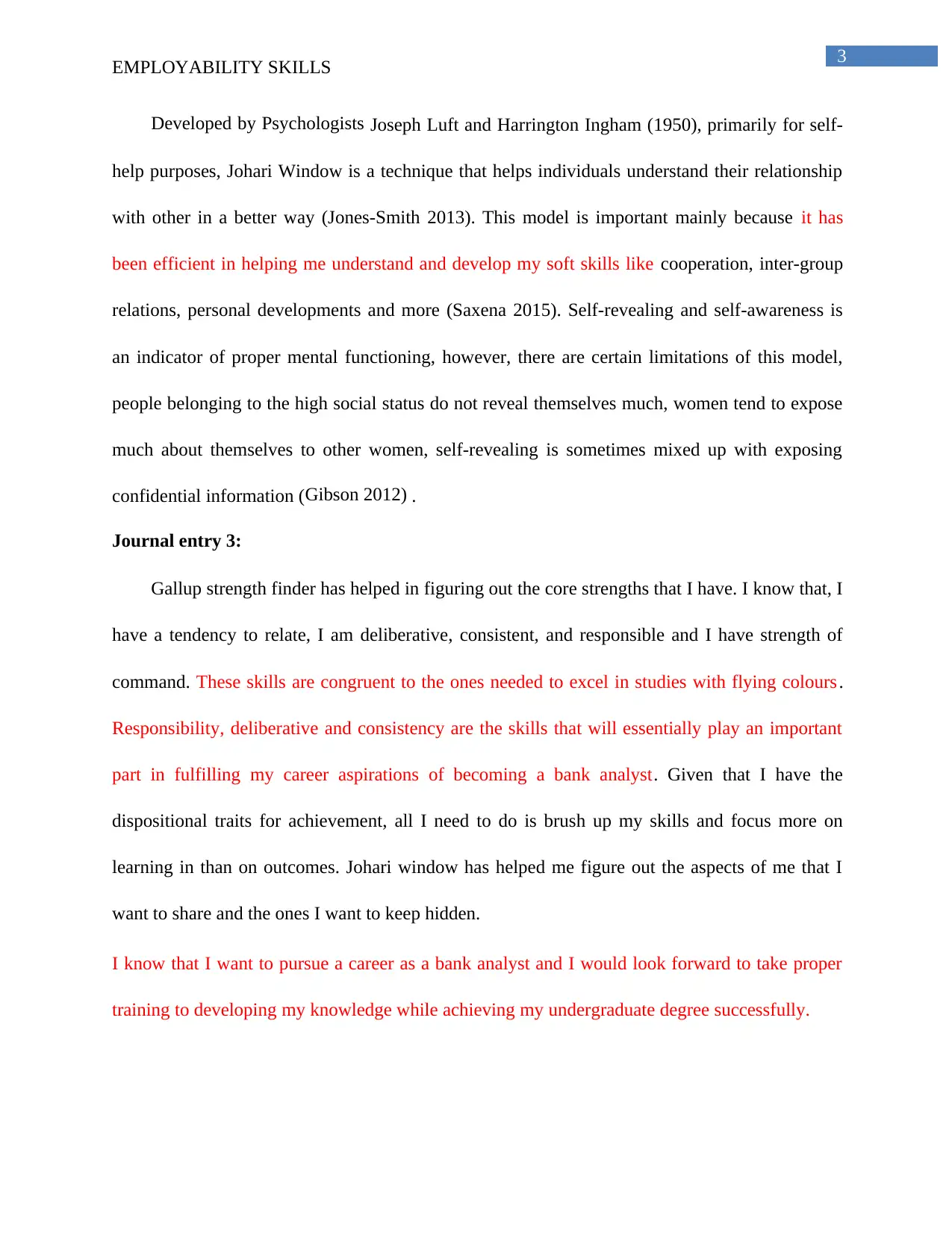
3
EMPLOYABILITY SKILLS
Developed by Psychologists Joseph Luft and Harrington Ingham (1950), primarily for self-
help purposes, Johari Window is a technique that helps individuals understand their relationship
with other in a better way (Jones-Smith 2013). This model is important mainly because it has
been efficient in helping me understand and develop my soft skills like cooperation, inter-group
relations, personal developments and more (Saxena 2015). Self-revealing and self-awareness is
an indicator of proper mental functioning, however, there are certain limitations of this model,
people belonging to the high social status do not reveal themselves much, women tend to expose
much about themselves to other women, self-revealing is sometimes mixed up with exposing
confidential information (Gibson 2012) .
Journal entry 3:
Gallup strength finder has helped in figuring out the core strengths that I have. I know that, I
have a tendency to relate, I am deliberative, consistent, and responsible and I have strength of
command. These skills are congruent to the ones needed to excel in studies with flying colours.
Responsibility, deliberative and consistency are the skills that will essentially play an important
part in fulfilling my career aspirations of becoming a bank analyst. Given that I have the
dispositional traits for achievement, all I need to do is brush up my skills and focus more on
learning in than on outcomes. Johari window has helped me figure out the aspects of me that I
want to share and the ones I want to keep hidden.
I know that I want to pursue a career as a bank analyst and I would look forward to take proper
training to developing my knowledge while achieving my undergraduate degree successfully.
EMPLOYABILITY SKILLS
Developed by Psychologists Joseph Luft and Harrington Ingham (1950), primarily for self-
help purposes, Johari Window is a technique that helps individuals understand their relationship
with other in a better way (Jones-Smith 2013). This model is important mainly because it has
been efficient in helping me understand and develop my soft skills like cooperation, inter-group
relations, personal developments and more (Saxena 2015). Self-revealing and self-awareness is
an indicator of proper mental functioning, however, there are certain limitations of this model,
people belonging to the high social status do not reveal themselves much, women tend to expose
much about themselves to other women, self-revealing is sometimes mixed up with exposing
confidential information (Gibson 2012) .
Journal entry 3:
Gallup strength finder has helped in figuring out the core strengths that I have. I know that, I
have a tendency to relate, I am deliberative, consistent, and responsible and I have strength of
command. These skills are congruent to the ones needed to excel in studies with flying colours.
Responsibility, deliberative and consistency are the skills that will essentially play an important
part in fulfilling my career aspirations of becoming a bank analyst. Given that I have the
dispositional traits for achievement, all I need to do is brush up my skills and focus more on
learning in than on outcomes. Johari window has helped me figure out the aspects of me that I
want to share and the ones I want to keep hidden.
I know that I want to pursue a career as a bank analyst and I would look forward to take proper
training to developing my knowledge while achieving my undergraduate degree successfully.
Paraphrase This Document
Need a fresh take? Get an instant paraphrase of this document with our AI Paraphraser
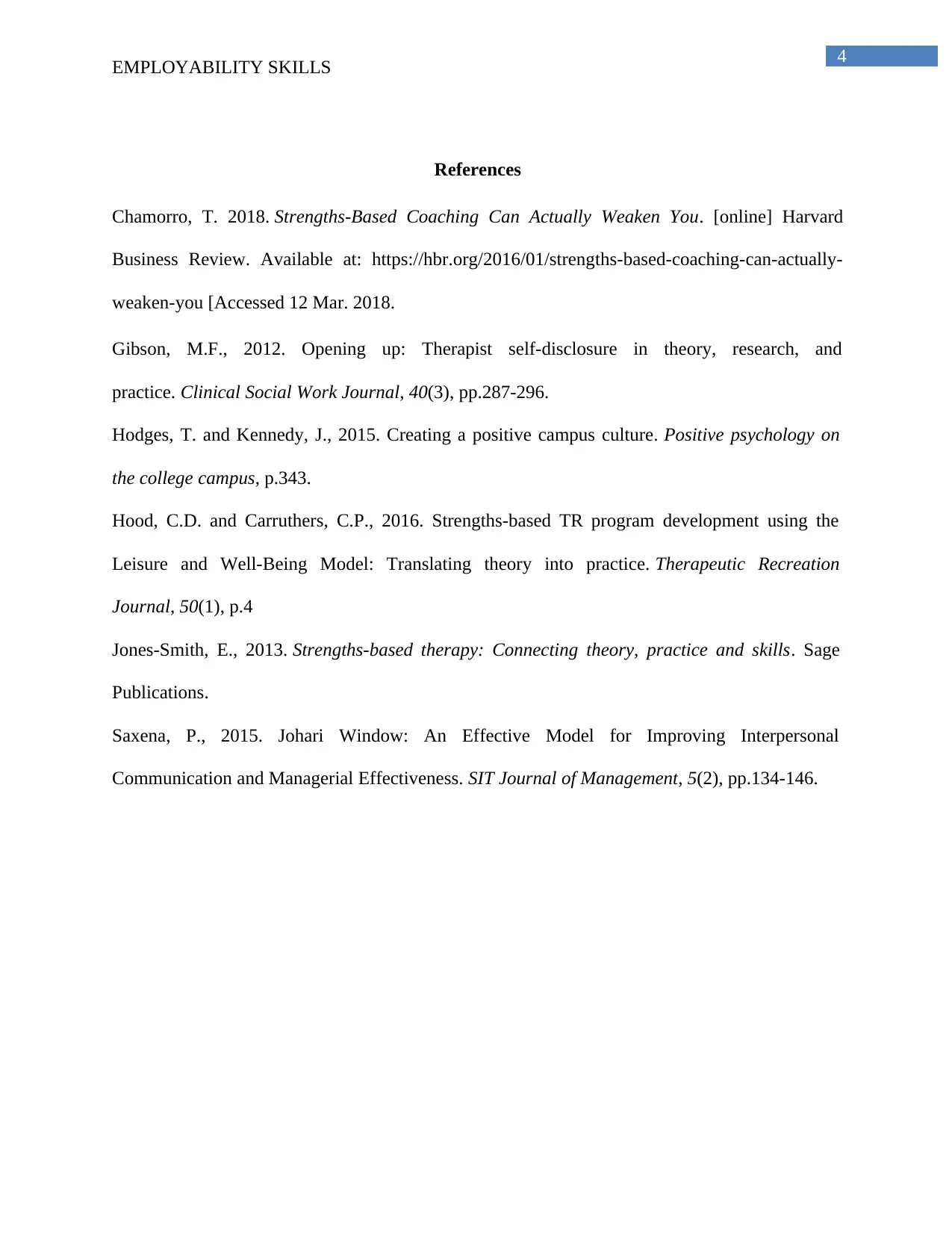
4
EMPLOYABILITY SKILLS
References
Chamorro, T. 2018. Strengths-Based Coaching Can Actually Weaken You. [online] Harvard
Business Review. Available at: https://hbr.org/2016/01/strengths-based-coaching-can-actually-
weaken-you [Accessed 12 Mar. 2018.
Gibson, M.F., 2012. Opening up: Therapist self-disclosure in theory, research, and
practice. Clinical Social Work Journal, 40(3), pp.287-296.
Hodges, T. and Kennedy, J., 2015. Creating a positive campus culture. Positive psychology on
the college campus, p.343.
Hood, C.D. and Carruthers, C.P., 2016. Strengths-based TR program development using the
Leisure and Well-Being Model: Translating theory into practice. Therapeutic Recreation
Journal, 50(1), p.4
Jones-Smith, E., 2013. Strengths-based therapy: Connecting theory, practice and skills. Sage
Publications.
Saxena, P., 2015. Johari Window: An Effective Model for Improving Interpersonal
Communication and Managerial Effectiveness. SIT Journal of Management, 5(2), pp.134-146.
EMPLOYABILITY SKILLS
References
Chamorro, T. 2018. Strengths-Based Coaching Can Actually Weaken You. [online] Harvard
Business Review. Available at: https://hbr.org/2016/01/strengths-based-coaching-can-actually-
weaken-you [Accessed 12 Mar. 2018.
Gibson, M.F., 2012. Opening up: Therapist self-disclosure in theory, research, and
practice. Clinical Social Work Journal, 40(3), pp.287-296.
Hodges, T. and Kennedy, J., 2015. Creating a positive campus culture. Positive psychology on
the college campus, p.343.
Hood, C.D. and Carruthers, C.P., 2016. Strengths-based TR program development using the
Leisure and Well-Being Model: Translating theory into practice. Therapeutic Recreation
Journal, 50(1), p.4
Jones-Smith, E., 2013. Strengths-based therapy: Connecting theory, practice and skills. Sage
Publications.
Saxena, P., 2015. Johari Window: An Effective Model for Improving Interpersonal
Communication and Managerial Effectiveness. SIT Journal of Management, 5(2), pp.134-146.
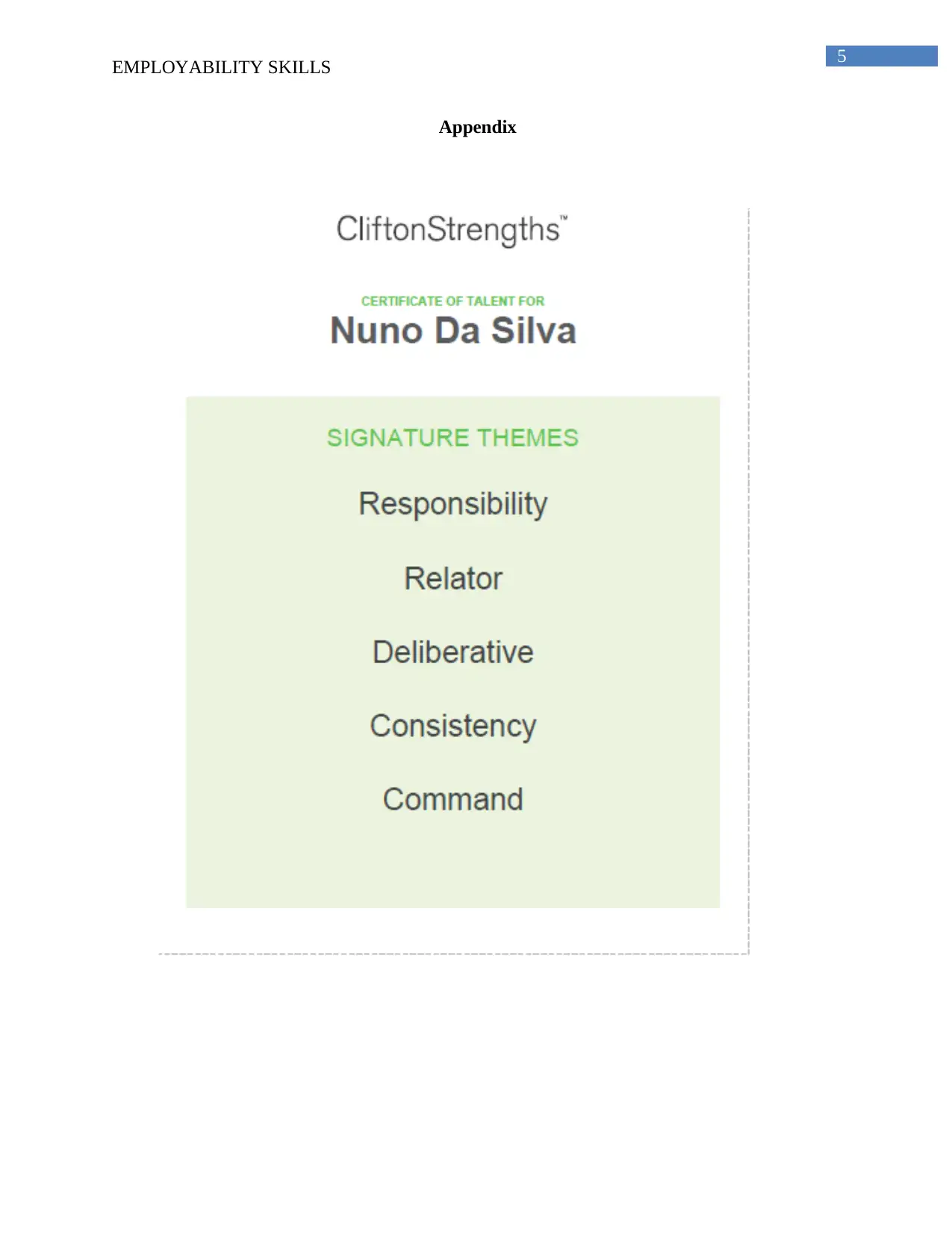
5
EMPLOYABILITY SKILLS
Appendix
EMPLOYABILITY SKILLS
Appendix
⊘ This is a preview!⊘
Do you want full access?
Subscribe today to unlock all pages.

Trusted by 1+ million students worldwide
1 out of 6
Related Documents
Your All-in-One AI-Powered Toolkit for Academic Success.
+13062052269
info@desklib.com
Available 24*7 on WhatsApp / Email
![[object Object]](/_next/static/media/star-bottom.7253800d.svg)
Unlock your academic potential
Copyright © 2020–2026 A2Z Services. All Rights Reserved. Developed and managed by ZUCOL.





